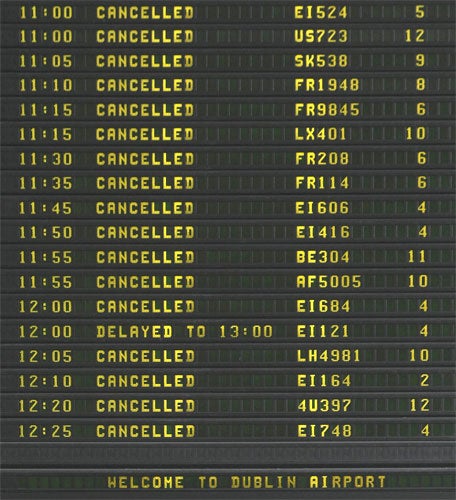Ash could disrupt air travel for a year, says government adviser

Air passengers could face further random disruption from volcanic ash in the coming weeks, a Government adviser warned yesterday.
Bill McGuire, a volcanologist and member of the Government's Cobra emergency committee, said the Eyjafjallajökull volcano in Iceland could cause further problems for up to a year, even though its explosions had become less intense. "It hasn't gone away," he said. "Previous eruptions have emerged over a year so it can carry on and on for a long time."
Professor McGuire, head of hazard research at University College, London, spoke after the volcano that brought such havoc last month disrupted British aviation again yesterday. Hundreds of services to and from Northern Ireland, the Republic of Ireland and western Scotland were cancelled before the ash cloud moved and the no-fly ban was lifted at 1pm. The Civil Aviation Authority Airspace confirmed last night that airspace over Scotland and Northern Ireland would close again from 7am today.
Asked whether there would be further trouble, Professor McGuire said: "It's perfectly possible. There could be bursts of ash and if the wind's blowing in the right direction it could affect the UK. But without a new vent we won't see a repeat of what we saw last month. Certainly the prospects don't suggest that's on the horizon." He added that he could not estimate the likelihood of a new vent opening because the volcano last erupted in 1820, when few records were kept.
Ireland was the worst hit by yesterday's disruption. Ryanair, the no-frills airline, cancelled all flights to southern Ireland, and to Belfast and Derry City in the north, until 2pm, while fellow Irish carrier Aer Lingus suspended all Irish services to Europe and the UK until 1pm.
Twenty flights were cancelled at Heathrow along with services to the Hebridean islands of Tiree, Barra, Benbecula and Islay, and Argyll in mainland Scotland, although flights from Continental Europe and transatlantic services passing over Ireland and Northern Ireland were not affected. Disruption is likely to spread today to areas not directly affected by the ash. Heathrow, Europe's busiest airport, warned travellers to check with their airline before travelling, while Ryanair is laying on extra flights to clear its backlog.
The restrictions were minor compared to those imposed across Europe last month, when all flights over Britain were cancelled for five days. Last week, the European Commission estimated the cancellations might cost the aviation industry £2.1bn.
Yesterday, the Association of British Insurers said the ash cloud would probably cost £62m in payouts to passengers who were unable to fly. Not all insurers are paying out, and many individual claims are relatively small, with policies typically paying £25 for every 12 hours of delay, up to a maximum of £250 to £300. Aviation authorities lifted the no-fly zones after plane makers set safe-flying limits for ash entering engines. Previously there were no safe levels for ash in aero engines, forcing aviation authorities to exercise extreme caution.
Ash spews into the air when magma from a volcano combines with ice on its sides. Most of Eyjafjallajökull's ice has melted, Professor McGuire said.
Join our commenting forum
Join thought-provoking conversations, follow other Independent readers and see their replies
Comments